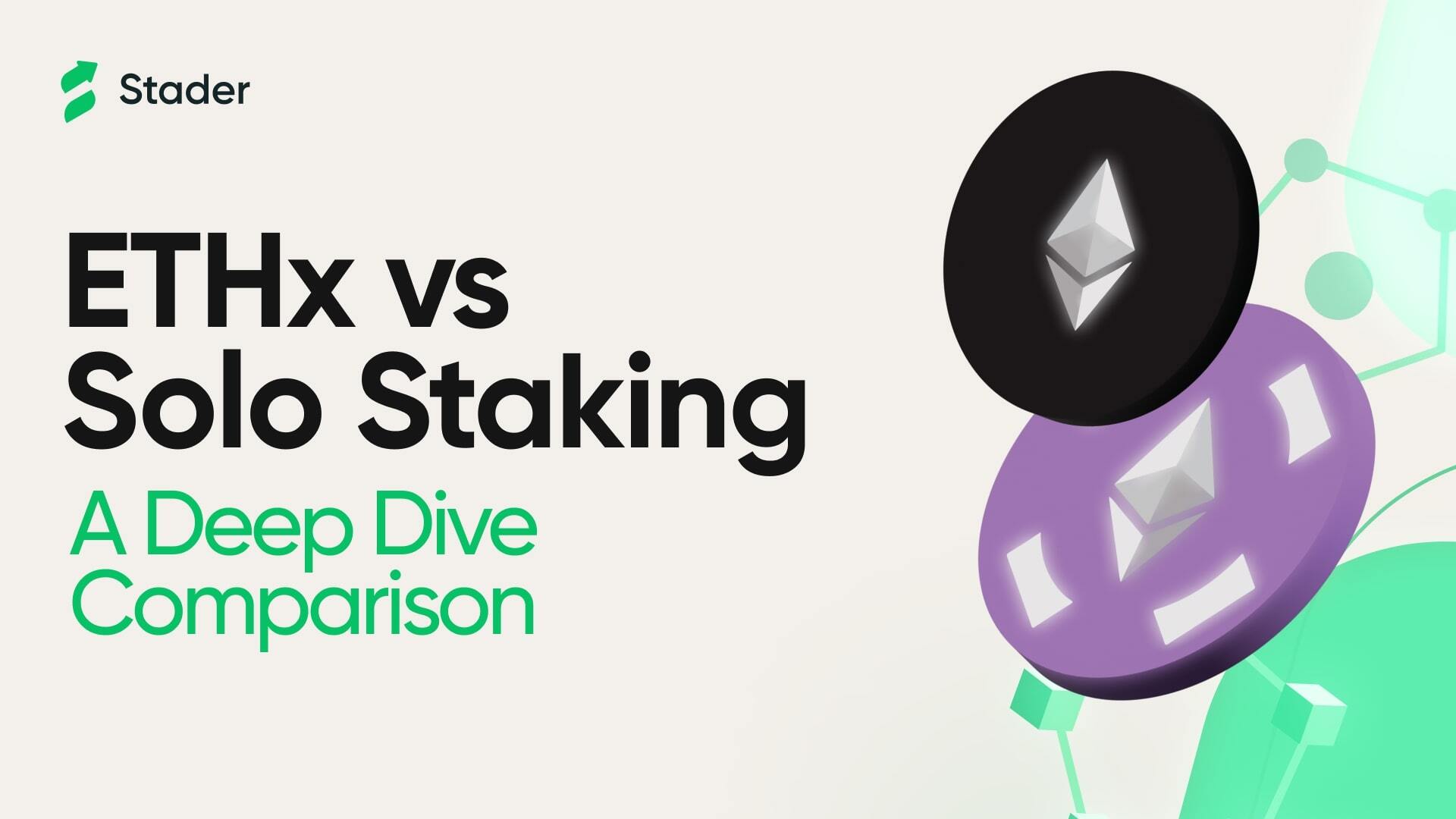ETHx vs. Solo Staking: Which is better?
Home
Blogs
Staking Basics
ETHx vs. Solo S...

ETHx vs. Solo Staking: Which is better?
Ethereum, a cornerstone of decentralized finance (DeFi), is undergoing an evolution in staking with the introduction of ETHx. This new approach offers numerous advantages over traditional solo staking, making it more accessible and rewarding for a broader range of users.
Also Read: Ethereum Staking Rewards
ETHx's Tremendous Reception
The response to the launch of ETHx has been astounding, with over 140 node operators joining the movement in a short span. Several factors contribute to its rapidly growing popularity:
- A significant 85% decrease in the required capital for staking.
- Minimal technical expertise is needed.
- Impressive 14%+ rewards for node operators.
Also Read: Ethereum Merge
ETHx's Mission & Pledge
Before diving deep, it's crucial to understand ETHx's core ethos. The primary aim behind this innovation is to preserve Ethereum's decentralization while creating an LST that is both accessible, reliable and rewarding
With ETHx, our mission at Stader is to maintain the decentralization of Ethereum by crafting a Liquid Staking solution based on three key tenets:
- Accessibility: To foster network growth, we are committed to ensuring that ETHx is accessible to everyone, from #nodeoperators to #stakers. By boosting accessibility, we aim to invite a diverse range of individuals to join and contribute to the ecosystem, emphasizing that Ethereum is genuinely a platform for everyone.
- Reliability: Stader's commitment is to provide a reliable solution that our community can trust. Our successful operations across six other PoS #blockchains, esteemed collaborations, and a doxxed team stand as proof of our dedication. Additionally, our emphasis on security is evident as ETHx has been triple audited by leading blockchain security firms and a $1Mn bug bounty.
- Rewarding: We firmly believe that active participation in the Ethereum network should be beneficial for all members. To this end, we've rolled out various initiatives and reward programs to enhance engagement and show our appreciation to our devoted community.
This pledge is Stader's solemn promise to the Ethereum community, and we're wholly committed to honoring it.
Also Read: Matic Staking Rewards
Why Choose ETHx Over Solo Staking?
- Capital Requirement: Traditional solo staking demands a hefty 32 ETH as a prerequisite. However, ETHx revolutionizes this approach. Validators can participate with just 4 ETH combined with 0.4 ETH worth of $SD. This new structure means that the remaining 28 ETH is sourced from user stakes, requiring node operators to commit 85% less capital initially.
This reduced requirement enables node operators to use their capital more efficiently, allowing for up to 8x leverage. In turn, this leverage translates to higher returns via commissions on the delegated $ETH, in addition to rewards on the bonded $ETH. - Technical Expertise: Solo staking has been perceived as a challenging venture due to the high level of technical knowledge required. Regular software updates and other maintenance tasks can make it a daunting task for many. But ETHx, with its strategic partnerships, simplifies the process.
Collaborations with Allnodes and Avado Cloud are a testament to this. Allnodes offers an affordable model, costing only $5 monthly per validator. In contrast, AvadoCloud offers a hassle-free, plug-and-play solution, reducing the entry barriers significantly. - Reward Structure: ETHx's reward system is where it truly shines. Consider the traditional model: staking solo with 32 ETH yields an annual reward of approximately 1.56 ETH. In the ETHx model, using the same 32 ETH to run eight nodes (with a 10% $SD bond) drastically alters the reward distribution:
Bonded ETH rewards: 1.56 ETH
Commission on delegated ETH: 0.77 ETH
Rewards from 1M SD: 1.29 ETH
This structure culminates in a net reward of 3.62 ETH, more than doubling the solo staking rewards.
Also Read: What is Validator
Conclusion
The decentralization of Ethereum is of paramount importance for its community. ETHx offers a promising pathway to ensure this vision remains intact. By rendering Ethereum staking more attainable, efficient and lucrative, ETHx is poised to redefine the staking landscape. For those contemplating Ethereum staking, the choice is becoming clear: ETHx nodes offer a compelling alternative worth serious consideration.
Also Read: Smart Contracts
Popular Searches
Ethereum Staking | BNB Staking | Ethereum Merge | Ethereum Gas | Polygon Vs Eth | How to Stake Eth | Ethereum Layer 2 | Ethereum Upgrade | Ethereum Bridge | Components of Ethereum Network | Liquidity Crypto | What Is MEV | Proof of Work Vs Proof of Stake | Tokenomics | Layer-2 Blockchain | Liquid Staking Derivatives | What is Validator | What Is A Private Key | Yield Farming Vs Staking | What is Web 3.0
By:
Zainab Saberi
Join Stader’s newsletter
Get the latest updates, new DeFi strategies and exclusive offers right in your email box
Analytics
© Copyright 2023 Stader. All rights reserved.











